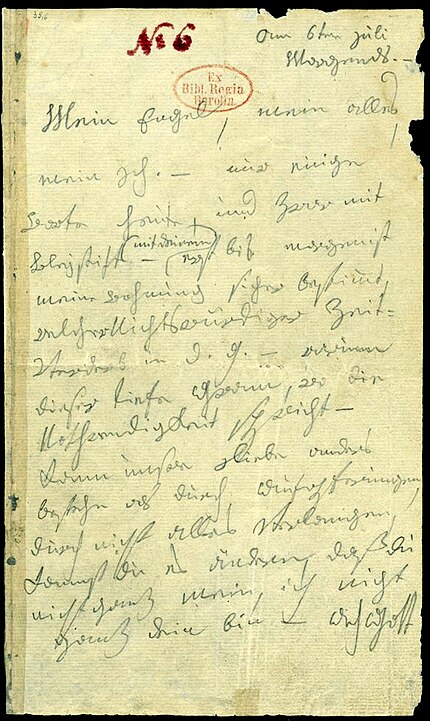Ludwig van Beethoven, one of the most influential composers in music history, was not only a master of symphonies and sonatas. He was also a man of deep passion and intense feelings.

Among the many intimate pieces that have survived the musical genius, one of the most poignant is a love letter addressed to a mysterious woman, often referred to as his “Immortal Beloved.” Although this letter was never sent, it remains a poignant testament to Beethoven’s desperate love.
Summary: “Immortal Beloved”
Historical Context
The letter to the Immortal Beloved was written in July 1812, a period when Beethoven was experiencing difficult times both personally and professionally. The composer, struggling with his increasing deafness, felt isolated and disconnected from the world around him. This letter, found after his death among his personal papers, reveals a vulnerable side of Beethoven rarely exposed in his musical works.
1812 was also a year of political upheaval in Europe, marked by Napoleon’s Russian campaign. This instability added an extra layer of tension to Beethoven’s life, who, despite his musical genius, was often plagued by personal anxieties and inner conflicts.
The Content of the Letter

The letter is written in three distinct parts over two different days, July 6 and 7, 1812. Here are some poignant excerpts:
July 6, morning:
“My angel, my all, my very self—only a few words today, and that in pencil (yours only). Why this deep sorrow, when necessity speaks—can our love exist otherwise than through sacrifices, by not demanding everything; can you change that you are not wholly mine, and I am not wholly yours.”
6 juillet, soir :
“Oh God—look at the beautiful nature and console yourself with what must be—love demands everything and rightly so, thus it is with me, with you—with me, with you—what a life!!!! thus!!!! without you—pursued by the kindness of people here and there, a life of a wanderer, without a companion.”
7 juillet, matin :
“In peace with the peace of nature—look at us certainly meeting soon; today I cannot share my thoughts that press upon me.”
These excerpts reveal not only Beethoven’s passion but also his torments and hopes. The depth of his love is evident, as is his suffering caused by separation and the obstacles between him and his Immortal Beloved.
The Identity of the Immortal Beloved
The identity of the Immortal Beloved remains one of the greatest mysteries of Beethoven’s life. Several women have been proposed as candidates, including the aristocrats Josephine Brunsvik and Antonie Brentano.
Josephine Brunsvik, a close friend of Beethoven, is often considered a possible recipient of this letter due to their intense relationship and her own letters to Beethoven. Antonie Brentano, another close friend, is also a serious candidate, particularly because of her presence in Prague at the same time Beethoven wrote the letter.
However, no definitive identification has been established. This ambiguity only adds to the legend and mystery surrounding this letter. Historians and musicologists continue to debate and search for clues, but the exact identity of the Immortal Beloved remains elusive.
Eternal love
The letter to the Immortal Beloved is much more than a historical document. It is a window into Beethoven’s soul, revealing a man capable of deep feelings and disarming vulnerability. It also shows the intensity of his love, a love that transcends time and obstacles.
For music and history enthusiasts, this letter is a reminder that behind every great artist lies a life filled with passion, pain, and intense emotions. Beethoven, with his letter to his Immortal Beloved, shows us that even geniuses are not immune to the torments of love.
Also discover: Extraordinary love story: Brigitte and Emmanuel Macron
The Legacy of the Letter
This letter, with its mystery and raw emotion, continues to inspire and fascinate. It has been the subject of numerous books, articles, and films, each attempting to uncover the secret of the Immortal Beloved’s identity and explore the depth of Beethoven’s feelings. The letter has also influenced many artists and writers who find in its words a source of inspiration for their own works on love and loss.
The legacy of this letter is a testament to Beethoven’s ability to express not only the grandeur and complexity of music but also the depth and intensity of human emotions. It reminds us that even at the height of his glory, Beethoven remained deeply human, vulnerable, and passionate, whose words still resonate today with undiminished power.
In short, the letter to the Immortal Beloved is a monument of eternal love, proof that great emotions transcend time and circumstances, leaving an indelible mark on the hearts of those who read it.
Also discover: Maître Gims: the poet of modern times – French rap (Hip-hop)
FAQ about Beethoven’s Letter to his “Immortal Beloved”
Who was Beethoven’s Immortal Beloved?
The identity of the Immortal Beloved remains a mystery. Among the most likely candidates are Josephine Brunsvik and Antonie Brentano, but no definitive identification has been made.
When did Beethoven write the letter to the Immortal Beloved?
Beethoven wrote this poignant letter in July 1812.
Why was the letter never sent?
It is not exactly known why Beethoven never sent this letter. Personal circumstances or external obstacles may have prevented its dispatch.
What is the main content of the letter?
The letter expresses Beethoven’s deep and desperate love, as well as his torments and hopes. It is written in three distinct parts over two days.
How was the letter discovered?
The letter was found among Beethoven’s personal papers after his death.
Why is this letter often called the Letter to the Immortal Beloved?
The letter is addressed to an unidentified woman whom Beethoven calls his u0022Immortal Beloved.u0022 This expression suggests an eternal and unalterable love.
What is the relationship between this letter and Beethoven’s music?
Although the letter is a written document, it reflects the same intense emotions and passion found in Beethoven’s music. It offers an intimate glimpse into the man behind the composer.
Are there any musical works by Beethoven inspired by this Immortal Beloved?
Although there is no direct evidence that specific works were inspired by this letter, the deep emotions expressed may have influenced his compositions from that period.
How has the letter been received by scholars and the public?
The letter has been a subject of great interest to scholars, musicologists, and the public. It is often analyzed and discussed in studies about Beethoven and his work.
What is the importance of this letter in the history of music and literature?
The letter is a poignant testament to Beethoven’s ability to express deep and intense emotions. It continues to inspire and fascinate, having influenced many artists, writers, and researchers.
This FAQ aims to answer the most common questions and shed light on the mystery and fascination surrounding Beethoven’s letter to his Immortal Beloved.
Also discover: 5 famous couples who made history from 2000 to 2024



